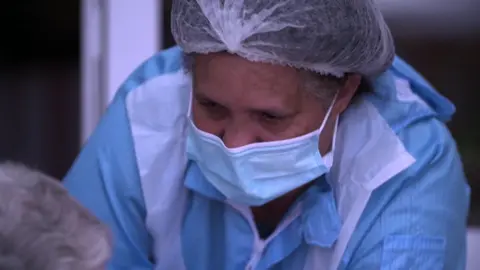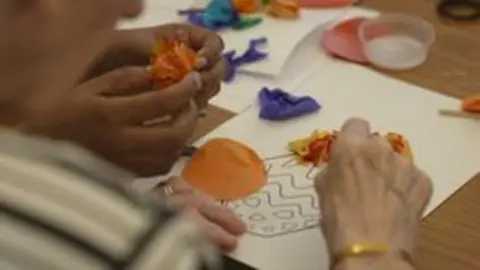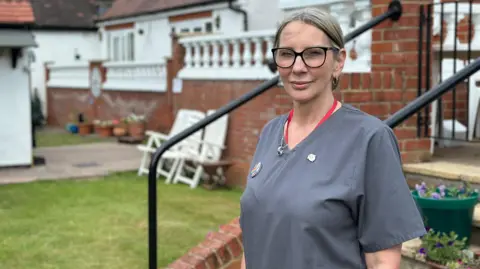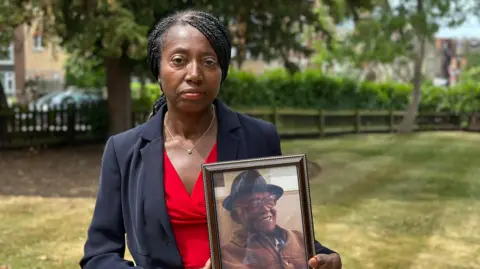Senior Social Affairs Producer
 BBC
BBCThe Covid inquiry will begin analyzing the affect of the pandemic on care companies for aged and disabled individuals on Monday.
Bereaved households say they’ve been ready for this second for years, describing the best way Covid swept via care houses as one of many clearest and most devastating failures of the pandemic.
Almost 46,000 care dwelling residents died with Covid in England and Wales between March 2020 and January 2022, lots of them within the early weeks of the pandemic.
The federal government says it helps the inquiry and is dedicated to studying classes from it.
There are key questions households and care workers need answering, together with why the choice was made in March 2020 to quickly discharge some hospital sufferers into care houses.
They blame this, partly, for seeding the virus into care houses within the early levels of the pandemic.
There are additionally questions on blanket “don’t resuscitate” notices being positioned on some care dwelling residents by medical companies, and about visiting insurance policies which prevented households seeing their family members for months.
“It was an terrible, terrible time,” says Maureen Lewis, supervisor of St Ives Lodge care dwelling in northeast London.
The house cares for as much as 35 individuals, lots of whom have dementia.
After we visited earlier this month, a number of the residents had been sitting spherical a desk within the eating space, making brightly colored collages of flower baskets. Employees and residents sat cheek by jowl chatting to one another.

This was an enormous distinction to our first go to on 15 April 2020. Then, workers had been dressed head to toe in protecting fits, their faces coated by masks. It was three weeks after the UK locked all the way down to attempt to cease Covid spreading. Regardless of this, St Ives Lodge had simply misplaced six residents in every week.
“That was the toughest. And that was proper on the very starting of Covid,” Maureen remembers.
On 17 April 2020 the variety of deaths in care houses reached its peak, with 540 individuals dying in England and Wales in in the future.
St Ives Lodge had locked down in mid March, however a resident who had returned from hospital developed Covid signs. Those that sat on the similar eating desk as him shortly confirmed the identical indicators. They died inside seven days of one another. The house later misplaced one other resident to the virus.
On the time, Maureen described how docs and district nurses refused to come back in, how care houses struggled to get protecting tools (PPE) and there was no useful steerage from authorities.
“We had been like a mini hospital,” she advised BBC Information, “coping with end-of-life care… Googling what to do”.
It was an expertise described by many different care dwelling managers who felt deserted by the federal government and NHS within the early months of the pandemic.
Wanting again, Maureen says: “There have been no protocols, no testing and [the NHS] was principally eliminating any residents again to care houses. They had been discharged as regular, however we had been in a pandemic.”
She needs the inquiry to seek out out why such choices had been made, and she or he needs these in positions of duty held to account.
She stays offended with the previous Well being and Social Care Secretary, Matt Hancock, for his assertion on 15 Could 2020, that the federal government had “thrown a protecting ring round care houses”.
“There was no ring of safety for care houses in any respect,” she says. “He must take accountability for the choices he made.”

Mr Hancock is because of give proof throughout the subsequent few days. It will likely be his seventh, and sure closing look.
For Jean Adamson, the proof which can be heard on the inquiry over the approaching weeks can be a very powerful but.
Her father, Aldrick, died with Covid on 15 April 2020. The final time she noticed him was when, while she stood outdoors, she glimpsed him via the window of his care dwelling just a few days earlier than he handed away. She was devastated she couldn’t be at his aspect.
“We weren’t allowed to say goodbye to him, to carry his hand,” she says. “It is an expertise that can stick with me endlessly. There isn’t any grief prefer it.”
She too has questions concerning the coverage of discharging sufferers to care houses.
On 17 March 2020 the NHS despatched a letter to all hospitals telling them to unencumber beds.
Over the following 4 weeks, an estimated 25,000 sufferers had been discharged into care houses many weren’t examined for Covid.
On 2 April 2020, the federal government suggested “unfavorable [Covid] checks will not be required” earlier than sufferers had been discharged into care houses.
This was modified on 15 April 2020, the day Aldrick Adamson died. New authorities steerage mentioned anybody discharged from hospital to a care setting could be examined first.

Jean Adamson believes sufferers who arrived at her father’s care dwelling from hospital may have seeded the virus there.
Different components corresponding to workers shifting between care houses and the unfold of the virus within the basic neighborhood may have performed a component however, she says, the speedy discharge of sufferers to care houses with out them being examined or remoted was a alternative.
“It was a reckless determination,” she says. “The best way that my father and tens of 1000’s of different care dwelling residents had been sacrificed. It actually will get me as a result of I feel it smacks of ageism and incapacity discrimination.”
Within the 5 years since her father’s dying she has develop into an lively member of the marketing campaign group, Covid-19 Bereaved Households for Justice UK.
She says the group needs the inquiry to take a look at the ban on care dwelling visits that stored households aside for months.
In addition they need solutions to why some individuals had been “routinely positioned on don’t try resuscitation orders [DNARs]”, with out dialogue with kinfolk or an evaluation.
“There was an abuse of the don’t try resuscitation coverage. We have to perceive how that happened,” she says.
The inquiry may even look at the difficulties confronted by care staff who supported individuals in their very own houses.
This part is predicted to final 5 weeks, with the report not due till subsequent yr.
For each Maureen Lewis and Jean Adamson the recollections of the pandemic stay traumatic and each say what they need now could be the reality.
“We have to perceive in order that we will study classes going ahead for when we now have the following pandemic and what occurred right here ought to by no means occur once more,” says Jean.
Maureen would love extra recognition of how care companies survived with out a lot assist.
In future, she says: “There must be extra funding” and higher planning for emergencies.


